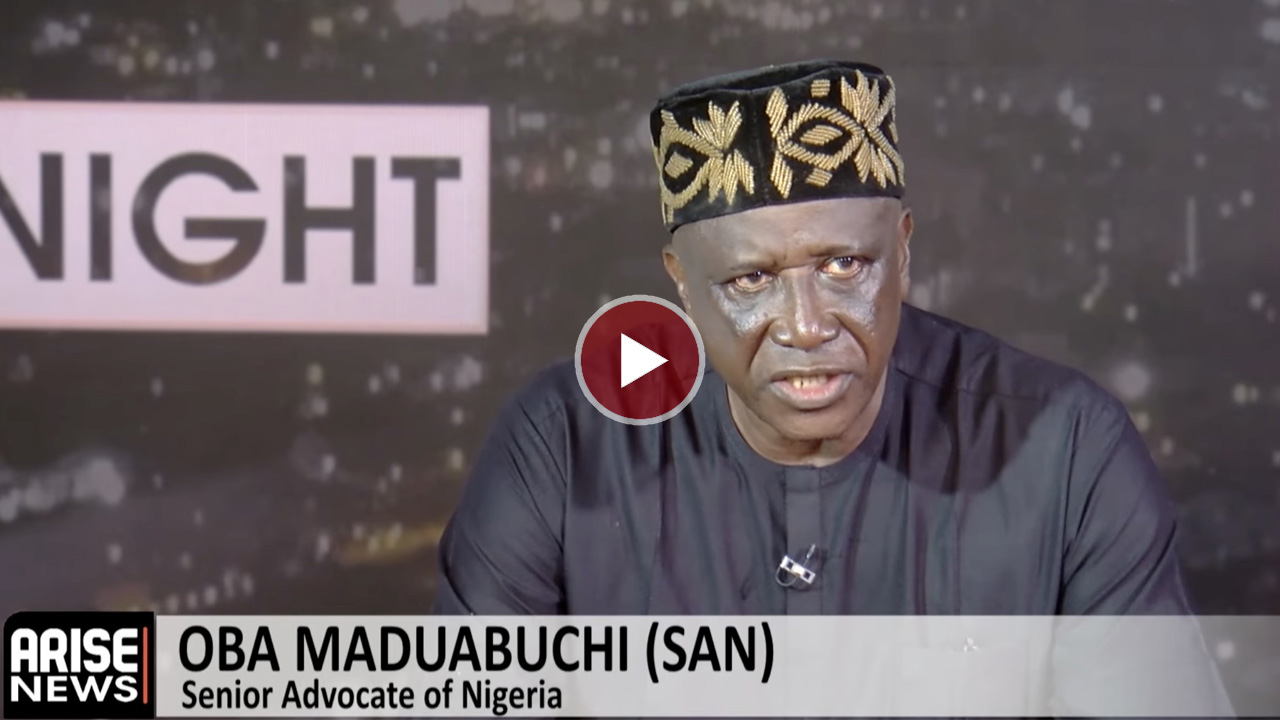

Senior Advocate of Nigeria, Oba Maduabuchi, has described the recent “Free Nnamdi Kanu” protests as ill-timed and an act of self-help, warning that lawyers participating in the demonstrations risk disciplinary action for interfering with ongoing judicial proceedings.
Speaking on ARISE News on Tuesday, Maduabuchi said while he sympathises with the sentiments behind the protests as an Igbo man, as a lawyer, he considers such actions legally unacceptable.
“As an Igbo man, I want them to release Nnamdi Kanu even yesterday because, according to them, he is a freedom fighter,” he said. “But as a lawyer, when you have handed your matter to the court, you are no longer entitled to resort to self-help. What they are doing now is simply self-help, which is not allowed by law. I think the protest is completely ill-timed.”
He noted that since the Federal Government had already closed its case against the IPOB leader, it was inappropriate for his legal team to be seen on the streets rather than presenting their defence in court.
“The Federal Government has closed its case, and I understand that the defence made a no-case submission which was overruled. The next step is to open your defence, not to go to the streets,” he said.
Reacting to claims by lawyer Maxwell Opara that nothing stops a lawyer or Nigerian from protesting, Maduabuchi disagreed, citing a disciplinary case involving a lawyer who was disbarred for interfering with a pending court matter.
“A lawyer in Abuja once lost a case in Kaduna, and while it was still on appeal, he went to the property in dispute and wrote on it that it was subject to litigation. He was disbarred for interfering with judicial proceedings,” Maduabuchi said. “Now imagine a lawyer defending someone and at the same time leading a street protest to pressure the government to influence the judge. That’s improper conduct.”
On the broader legal process, the SAN argued that Nnamdi Kanu’s case had not lasted as long as some claim.
“When they say Nnamdi Kanu has spent four years on trial, I beg to disagree,” he said. “After he was granted bail, he escaped. It was about three years ago that he was brought back to Nigeria. Since then, the prosecution has been ready to proceed. If you follow the trial closely, you’ll see that many of the most incriminating pieces of evidence against him were rejected by the court. If those are excluded, Kanu may likely walk free.”
Maduabuchi, however, stressed that pressuring the government through protests to release a person standing trial undermines judicial independence.
“It is not possible for you to force a responsible government that has charged someone to court to release him through street protests. You can’t tell a judge how to decide a matter before him,” he said.
On constitutional reform, the SAN also reacted to recent calls by legal luminary Chief Wole Olanipekun (SAN) for a new constitution, rejecting the idea as impractical and dangerous for national unity.
“If you remove this constitution, what you have removed is Nigeria itself,” he warned. “Our existence as a country is tied to this constitution. Without it, there will be no Nigeria, no passport, no basis for citizenship.”
He maintained that the 1999 Constitution was largely drafted by civilians, even though it was promulgated under military rule, and that the National Assembly remains the legitimate body to amend it.
“Those saying we need a people’s constitution should tell us how ‘the people’ will come together to draft one. Somebody must organise it. Even the military did not draft this constitution alone. Civilians were deeply involved,” he explained.
However, Maduabuchi faulted the National Assembly’s frequent amendments, saying most of them were self-serving.
“I see these amendments as ways for the National Assembly to take money from Nigerians. The real problem is not the document but those implementing it,” he said. “When our lawmakers stop thinking tribally and start acting in the national interest, then the constitution will begin to work for everyone.”
He added that the focus should shift from how national resources are shared to how they are generated.
“When they talk about amending the constitution, what they are really doing is deciding how to share money,” Maduabuchi said. “We must focus on how to make money, not just share it.”
Maduabuchi concluded that genuine constitutional reform and justice depend on the integrity of those in power, not on drafting new documents.
“It’s not really about the document but how you implement it. That’s our main problem,” he said.
Boluwatife Enome


